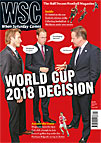 After controversial events during the Old Firm derby, Mark Poole writes why Scottish referees find themselves in a season of turmoil
After controversial events during the Old Firm derby, Mark Poole writes why Scottish referees find themselves in a season of turmoil
Maybe it should have been a penalty, maybe it shouldn’t, but the decision that went against Celtic at Tannadice on October 17 has led to lies, controversy, misinformation, a linesman’s resignation, demands for apologies and further resignations, and a referees’ strike.
When Celtic’s Gary Hooper took a tumble in the box following a challenge from Dundee Utd goalkeeper Dusan Pernis, referee Dougie McDonald pointed to the spot. He was soon surrounded by angry defenders. He then consulted his linesman, Steven Craven, and reversed his decision. It was a game that Celtic didn’t look like winning at the time, although a late goal swung it in their favour. After the game, McDonald explained to his match supervisor and to Celtic manager Neil Lennon that he’d got a shout on his earpiece from Craven, saying he’d seen Pernis get the ball first. So no harm done, in the sort of exciting, competitive game that is all too rare in the SPL.
But then Craven resigned. Across the press, stories were published about his resignation featuring quotes from ex-referee Kenny Clark about how Scottish refs sometimes received razor blades in the post and had their windows smashed. The implication that could be drawn from these reports was clear: that Celtic fans had driven Craven out of the game. New SFA chief executive Stewart Regan called for a “respect” campaign for referees.
Two days after Regan’s appeal, in an interview with the Sunday Mail, Craven stated that the bullying that led to his resignation came not from fans, but from McDonald and the head of referee development, Hugh Dallas. Craven claimed that he had not called McDonald over. He says that the referee had run across, saying “I think I’ve fucked up”, before reversing his decision. And that after the match McDonald suggested lying to their supervisor and Lennon about why he’d changed his mind. Craven also claims that Dallas pressured him to maintain his lie.
Both McDonald and Dallas dispute the details of Craven’s interview. McDonald says it was Craven who suggested lying, while Dallas claims he never put pressure on the linesman. McDonald’s actions were investigated by an panel of six SFA employees – five of whom were former referees. They found him guilty of lying, but only gave him a warning.
Regan then announced that he would examine how the refereeing committee works. As well as having their disciplinary hearings conducted by their peers, individual referees often hear appeals against their own decisions. The system sorely lacks transparency and accountability.
McDonald and Craven’s lie wasn’t a big one, but it saved McDonald from allegations that he had given in to pressure from Dundee Utd defenders to change his decision. Lennon wants an apology from McDonald. John Reid has gone one further: “He [McDonald] should go and, if not, he should be removed from his post,” said the Celtic chairman and former home secretary. “There cannot be integrity in a system that allows a referee to lie.”
Celtic and the SFA haven’t been on the best of terms recently. Last season, the club queried three key decisions in games against Rangers. This November, referee Willie Collum received telephone threats after he gave Rangers a controversial penalty in an Old Firm match, and Lennon received a two-match touchline ban for his behaviour during a match against Hearts.
Two days after Reid’s comments, the referees announced their intention to strike, stating that the scrutiny they were working under was leading to personal threats against them. Over the weekend of November 27 and 28, SPL matches were covered by referees from Luxembourg, Israel and Malta. SPL chief executive Neil Doncaster said: “I’m really surprised and disappointed that referees felt the need to walk away from matches rather than talk about a solution.” Meanwhile, Lennon admits that he has “crossed the line” with officials at least once this season.
Given the frequently dangerous passions that surround the Old Firm, Celtic (and Rangers) have a greater responsibility than other clubs to avoid inciting threats. It is often difficult to balance this with their equal right to appeal against decisions. But it is a gamble for the referees to demand that the clubs stop questioning them, when at the root of the problem is a referee who was not punished for lying to his supervisor and a club manager. Many fans will now view McDonald as untrustworthy and his recent actions will undermine his authority the next time he has to make a big decision, particularly one that affects Celtic.
Players, managers and fans across the world need to show referees more respect. But the SFA must introduce greater transparency and accountability to the country’s archaic refereeing set-up. As referee Charlie Richmond said: “We have been trying to get referees and managers to work together. But if you tell a lie to a fellow professional, it’s going to hinder that relationship.”
From WSC 287 January 2011